Portugal Retirement Visa – How to Apply & Relocate

Are you dreaming of spending your golden years in Portugal?
With its stunning coastlines, relaxed lifestyle, low cost of living and the recent tax law changes Portugal offers a perfect setting for many retirees.
Retirees looking to move from the UK will have to apply for a retirement visa.
However, you’re in luck if this applies to you as Portugal has some of the most lax requirements in the EU!
Even with these lenient requirements, it’s always good to be in the know-how when it comes to moving abroad.
That’s why we’re here to help!
This guide is packed with helpful tips and tricks covering everything you need to know about obtaining a Portugal retirement visa and will hopefully ensure a smooth moving process for any who choose to embark on this exciting adventure.
Why Portugal?
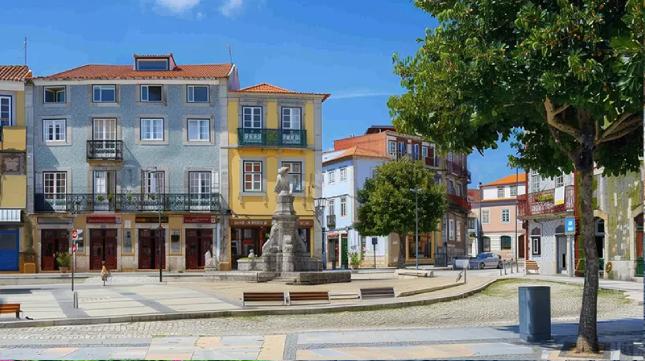
Póvoa de Varzim is one of the top retirement locations for expats moving to Portugal.
Retirement in Portugal is an exciting prospect and offers a great opportunity to fully enjoy your golden years.
But what makes this gorgeous country such an attractive proposition for so many?
Here are four reasons so many retirees are looking towards Portugal so favourably:
- Affordable Cost of Living: Portugal boasts a lower cost of living compared to many Western countries, making it an attractive option for retirees from the UK where prices show no sign of slowing down.
- Beautiful Weather: With its mild climate, Portugal offers warm and sunny weather, which is extremely beneficial for your health as you age.
- Safety: Portugal is one of the safest countries in Europe, providing security and peace of mind for you and your family throughout your retirement years.
- Healthcare: Portugal’s healthcare system is held in very high regard, offering both public and private options so everyone is accounted for.
If these four reasons aren’t enough to turn your head, perhaps the ease with which you can make the move will!
The big bonus for many is that post-Brexit, non-EU citizens can still retire in Portugal very easily.
You will need to apply for a residence permit which will take some time however, the process is pretty straightforward; it just involves a little more paperwork.
Types of Retirement Visas
As us Brits are no longer EU citizens, you will need to apply for a visa when retiring in Portugal, luckily there are two excellent options to choose from:
The D7 Visa
The D7 Visa, often referred to as the passive income visa, is the most popular choice for retirees.
Choosing this option requires proof of a steady passive income such as a pension, rental income, or investment dividends.
As of 2024, the minimum income requirement is €820 per month.
The Golden Visa
The Golden Visa is the perfect option for those who are able to make a significant financial investment in Portugal.
This visa option will require an investment of at least €500,000 in Portuguese funds or businesses.
Choosing to go down the Golden Visa route will offer you more flexibility in terms of residency requirements, allowing you to stay in Portugal for as little as seven days per year.
Meeting the Eligibility Criteria
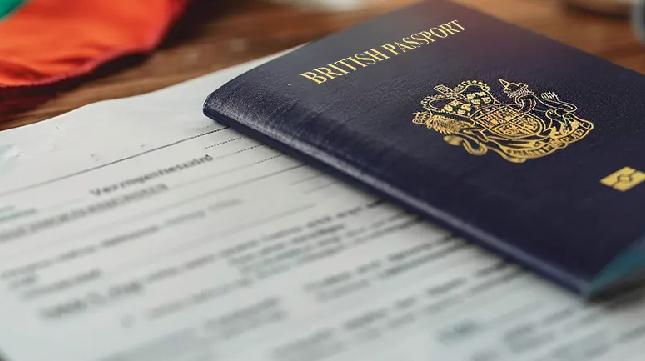
UK Passport and Visa Application
To apply for a Portugal retirement visa, you must meet several eligibility requirements and prepare specific documents ahead of your move.
Here’s everything you need for the process:
- Valid Passport: Ensure your passport is valid for at least six more months from your application date.
- Passport-Sized Photos: Provide two recent photos that comply with Schengen visa requirements.
- Visa Application Form: Complete the national (residence) visa application form, available for download from the Ministry of Foreign Affairs of Portugal.
- Proof of Income: Demonstrate that you have sufficient financial resources to support yourself during your stay. This can be from pensions, savings, or other legitimate income sources.
- Proof of Accommodation: Show evidence of accommodation in Portugal, such as a rental agreement or property ownership documents.
- Health Insurance: Obtain travel health insurance or an international health insurance plan for expats before moving. Once in Portugal, you can continue with the international policy or switch to a local insurance provider.
- Civil Documents: Provide a birth certificate and, if applicable, a marriage certificate.
- Criminal Background Clearance: Submit a criminal record check to prove you have no criminal charges punishable by imprisonment for a year or more.
- Additional Documentation: Be prepared to provide any other documents required by the Portuguese Embassy or the Serviço de Estrangeiros e Fronteiras (SEF).
By ensuring you have all these documents ready, you can streamline your application process and increase your chances of a successful visa approval.
An important thing to keep in mind is that all of the documents you submit must be in English or Portuguese.
If any of your documents are in another language, they must be translated by a certified translator and notarized for authenticity.
Additionally, some documents, particularly civil documents, may need further legalisation.
Don’t fret, this can be done through an Apostille Stamp or by getting your documents authenticated at the Portuguese Embassy and is a fairly easy process to complete.
The Application Process
Applying for a Portugal retirement visa involves several steps.
Here is a detailed look at the process:
- Contact the Portuguese Embassy or Consulate: You will need to find the Portuguese Embassy or Consulate responsible for the area you live in so you know where to submit your visa application.
- Make an Appointment: Schedule an appointment to submit your application. This step is crucial as you need to ensure that you can present your documents in person.
- Collect Required Documents: Gather all necessary documents, including your passport, visa application form, proof of income, proof of accommodation, health insurance, and any other required documents.
- Pay the Visa Application Fee: Pay the visa application fee. In some cases, you will be required to pay this fee on the date of your appointment, but it’s important to validate the payment process with the relevant officials.
- Submit Your Application: On the day of your appointment, submit your collected documents to the Embassy or Consulate. If it is in a different country from where you live, you might be allowed to submit your application by mail. The visa officials will provide specific instructions that are relevant to your specific requirements.
- Wait for Processing: After submission, you will need to wait for the application to be processed. Processing times can vary, so be sure to apply well in advance of your intended travel date!
- Receive Your Visa: If your application is approved, you will receive a retirement visa, which will be attached to your passport and allows you to travel to Portugal.
- Arrival in Portugal: Once you arrive in Portugal, make an appointment with the Serviço de Estrangeiros e Fronteiras (SEF) to apply for your residence permit. The Embassy/Consulate may even automatically arrange this appointment for you but they will need to be aware of your travel plans.
Following each of these steps will help you navigate the application process smoothly and will give you the best chance of being successful in receiving a retirement visa.
Costs and Fees
Now that you know how the process works, you’re probably wondering how much the application will cost!
Whilst there are a number of fees, you may be surprised at the cost:
- Embassy/Consulate National Visa fee – €90
- Processing of your residence permit application at the SEF – €83
- Residence Permit – €72
The cost of applying may be minimal in the grand scheme of things but you should try to avoid making any mistakes to keep the costs down.
Approval of your Application
Once submitted, the application approval takes time to be approved, so don’t worry if you don’t hear anything straight away.
Each embassy is different, and each one has a different timeline for processing, depending on how busy they may be.
Plus, if the information you have supplied is incorrect, incomplete or requires further investigation it can cause significant delays.
It is therefore vital to ensure that everything you submit is as correct as possible.
As a guide, allow approximately 21 workdays from the date on which the application is received by the Embassy.
A further 2-3 workdays should be expected for the return of your passport and other supporting documents.
You will be notified of the embassy’s decision via post or email
Post-Arrival Steps
Once you have arrived in Portugal there are some important things you will need to put in place.
Getting a NIF
The Número de Identificação Fiscal (NIF) is essential for a range of activities in Portugal, including opening a bank account and signing leases.
You can obtain your NIF from the local tax office (Finanças) or through a fiscal representative (Global Citizen Solutions) (Expatra).
Opening a Bank Account
Opening a Portuguese bank account is straightforward. You’ll need your NIF, passport, and proof of address. Many banks offer online banking services, making it easier to manage your finances (Expatra).
The Golden Visa
There is another route that retirees can take but it is more costly.
A Golden Visa may work better for you if you have the funds to support it.
To apply for this, you need to invest at least €500,000 in Portugal.
There are many ways to do so, other than in property such as:
- Donation to Arts €250,000
- Venture Capital/Private Equity Fund €500,000
- Donation to Research Activities €500,000
- Company Creation 10 employees or €500,000 + 5 employees
This visa grants qualified foreign investors a residence permit and the potential to get citizenship after five years.
Using a Migration Agent

We would suggest using a migration agent when moving to Portugal for
It is particularly important to note that visa requirements can change suddenly and without warning.
Because of this, it makes sense to hire a good migration agent.
They are well versed in the difficulties connected to immigration into Portugal.
Migration agents will have a full understanding of Portuguese laws, regulations, and visa requirements and will also understand the language.
Here are a few to consider:
Healthcare in Portugal

Portugal’s Healthcare provisions are excellent.
As we get closer to our retirement years, it is often the case that healthcare provisions becoming increasingly important.
You’ll be glad to hear that Portugal has an excellent healthcare system offering both private and public services.
If you are considering retirement here you will need to arrange private health coverage in the interim period before you qualify for access to the public health system (SNS).
Once you become a resident, you’ll be entitled to the full benefits of Portuguese healthcare.
To use health care in Portugal you need an SNS number however, for expats from outside the EU including us Brits, you can use your residency card instead.
The latter will be the case for anyone moving to Portugal with the D7 Visa or the Portugal Golden Visa which are the two visa options discussed in depth earlier.
Don’t be fooled by any stories of bad service via the SNS you read online, a quick search of various online forums like Reddit will tell the true story!
Various people have praised the excellent service and efficiency although, like in the UK, there can be times when the hospitals feel rather busy.
There is plenty of information about the Portuguese health system as an expat to check out online.
Tax Implications
Portugal has historically offered favourable tax conditions for retirees, particularly under the Non-Habitual Resident (NHR) scheme, which provided significant tax benefits for the first ten years of residency.
However, in late 2023, it was announced that the Non-Habitual Resident (NHR) tax regime would be ending, as parliament deemed it no longer beneficial to the country.
If you missed the opportunity to benefit from the original NHR regime, you still have a chance to make the most of the new NHR 2.0, although these don’t have the same parameters as before.
The new regime retains many of the original benefits but has a significantly narrower eligibility pool, with a shift in focus towards employment, particularly in scientific research and innovation.
This means it no longer extends its benefits to retirees and other high-value professionals, certainly something to keep in mind if you were considering retiring in Portugal for the tax benefits.
Buying a Home in Portugal
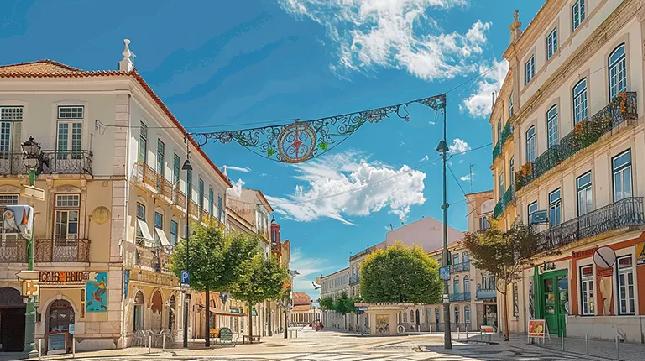
Buying Property in Portugal is a great decision if you are considering staying for the long term.
Buying a home is a worthy investment when you move to Portugal permanently for your retirement.
Portuguese property prices increase in the same way as in any other country and whilst not quite as much as they do in the UK, it still makes good financial sense to eventually buy your own home here.
House prices are cheaper for the most part, in fact, Portugal has some of the best-priced real estate in Europe!
If you have a smaller budget, we recommend avoiding cities such as Lisbon and Porto as well as much of the Algarve, these locations tend to be the most expensive and you may not find great value for money here.
Some great alternative areas you may want to consider include the Silver Coast or the Azores where homes tend to be cheaper.
To save even more money you could even consider a move inland!
Though you won’t be on the coast, most houses and villas will still have private pools that will more than make up for it!
Decide Where are you Going to Live?
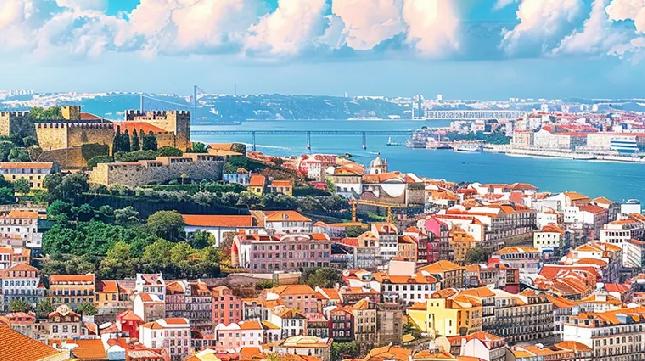
Lisbon is a great choice for those looking to retire in a busy city.
Portugal is packed with some stunning locations, with locations sure to meet the needs of every potential retiree.
If you are already familiar with the different regions and have spent time exploring already, you are likely to know where you are going to relocate to.
However, if you haven’t had the chance to visit, it’s time to get exploring!
You need to ask yourself what it is you want from your retirement.
Do you want to live by the sea, amid Portugal’s more central areas with historic towns, rolling hills, and lush forests, or is city life calling you?
Try and narrow your search and concentrate on a few locations that are your top contenders.
Visit each place you have identified and create a pros and cons list for each.
If possible, consider renting a property in your top choice for a short trial period before making a long-term commitment.
Get out of your comfort zone and start conversations with those already living in the area.
This is typically the very best way to find out more about any area and who knows you may make some friends along the way!
Popular Locations with Retirees
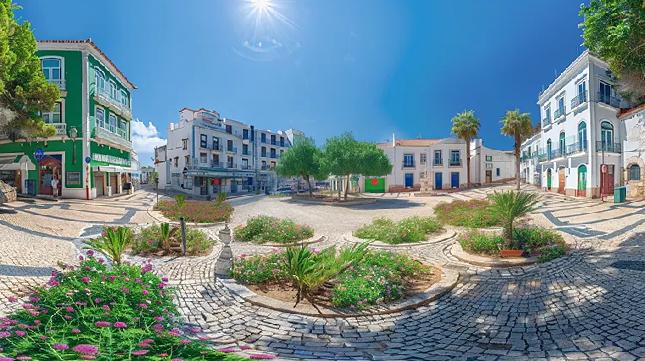
Lagos is one of the Algarve’s top picks.
Here are some of the most popular locations in Portugal for retirees.
These are just some of our favourites but be sure to carry out some of your own research to find some more hidden gems!
Lagos: An upmarket location sitting in the Algarve Region. Packed with historical sites, a pretty old town area and pristine beaches. Lagos offers a relaxed lifestyle, excellent healthcare facilities, and plenty of amenities for retirees.
Sintra: Nestled in the foothills of the Sintra Mountains, Sintra is a UNESCO World Heritage Site known for its fairytale palaces, lush gardens, and romantic atmosphere.
Castelo Branco: Located in central Portugal. This area offers a peaceful and culturally rich environment for those seeking a quieter way of life along with very favourable property prices.
Figueira da Foz: Sitting on the Silver Coast this area is arguably the cheapest in the country. Residents can enjoy dining at local restaurants, shopping at markets, attending cultural events, and exploring nearby nature reserves.
Alcobaça: Located in the central-western region of Portugal. Despite being small, Alcobaça hosts a variety of cultural events and activities throughout the year, including festivals, concerts, and art exhibitions. Residents can immerse themselves in the local culture and enjoy its vibrant community spirit.
Póvoa de Varzim: A small town that sits not far from central Porto in the northern region. It offers an appealing combination of affordability, proximity to a major city, and a relaxed coastal lifestyle. It is a popular area with both locals and visitors as its main beach is one of the best in the North.
Portimão: Ideally located between the Central and Western Algarve. Although it may be a city, it is quite small. You can easily live here without a car. There are great amenities ideal for retirees, including malls, hospitals, and many hotels and restaurants.
Wherever you settle, Portugal’s exceptional quality of life, combined with its affordability, accessibility, and diverse range of lifestyle options, makes it a popular destination for those seeking a fulfilling and rewarding retirement experience.
Using a Reputable Moving Company

White & Company Truck
Moving to Portugal is a far more tricky task than moving home within the UK.
Getting a Portugal retirement visa is just the start of your moving journey.
You will need the help of an experienced and reputable European mover such as White & Company.
White & Company offers comprehensive services across the entire country, tailored to meet your needs regardless of the scale of your relocation.
From the careful packing of your possessions in the UK to ensuring their safe delivery to your new home in Portugal, we accompany you every step of the journey.
Additionally, we offer storage solutions for your belongings, providing flexibility in your relocation process.
If you prefer to go ahead of your belongings to secure temporary accommodation, our purpose-built facilities guarantee the safety of your items in the UK until you are ready for them.
For more information on shipping your goods to Portugal, give us a call.
Alternatively, fill out a quick quote form, and one of our helpful members of staff will get back to you ASAP.
With over a century of experience since our establishment in 1871, there is little we haven’t encountered.
You can trust us to provide you with our utmost attention and assistance at all times.
Don’t hesitate to make the call – it could mark the beginning of a life-changing decision.

Max is a seasoned writer and blogger in the real estate and home moving sectors, as well as a knowledgeable source of information for expatriates living and working abroad. His detailed insights have helped thousands of people move and live abroad with greater simplicity and ease.
Posted in: News
Leave a Comment (0) ↓


